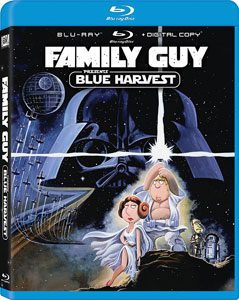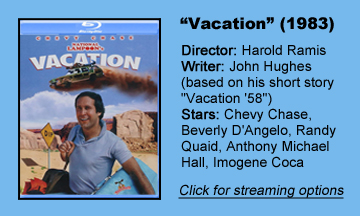“National Lampoon’s Vacation” (1983) both makes fun of and lauds the archetypal dad who wants to show his family a fun time but runs into a building stream of annoyances and gradually loses his mind. Writer John Hughes shows love and sympathy for this type of person, and has the perfect actor to embody Clark Griswold in Chevy Chase.
Pushing his patience
As the Griswolds drive from Chicago to Walley World in Los Angeles, Clark brushes off, rationalizes, dad-splains and takes a sunny outlook on all their bad breaks – up to a point. Then come his F-bombs and the antics at Walley World – a Disneyland stand-in, as it was not yet the colloquial term for Walmart — that has wife Ellen (Beverly D’Angelo) convinced that Clark will “be going away for a while” after this.
Working from his short story “Vacation ’58,” Hughes writes great set pieces and gags, sure, but Chase keeps the smile-worthy momentum going with help from the believable family around him. D’Angelo is perfect as the wife who humors her husband.
The Griswold quartet is rounded out by son Rusty (Anthony Michael Hall, later a staple of Hughes’ teen films) and daughter Audrey (Dana Barron, who – trivia time – would reprise her role in the little-seen “Christmas Vacation 2” two decades later).
Clark’s honest attempts to find fun go wrong (the 50-yard leap of his station wagon off a closed road), and his missteps certainly go wrong (not-so-private skinny dipping with Christie Brinkley), and Chase’s facial expressions sell most of it. An example is when Clark has a sit-down with Rusty in the Arizona desert after the car leap: The two halves of Clark’s glasses fall off his face, but he keeps going with the motivational speech.
It’s interesting that “Vacation” – briskly directed by Harold Ramis – maintains an air of being a family friendly yarn. It features brief nudity – Clark does the “shower scene” gag on Ellen in this year that “Psycho” returned to prominence with its first sequel – and the aforementioned F-bombs. Maybe there’s something about a dad swearing that makes it milder and funnier.
Now-dated humor
But even more extreme, “Vacation” gets humor out of animal cruelty and the death of an aunt. It’s accidental animal cruelty, and Dinky was not a nice dog, and Imogene Coca’s Aunt Edna is not cuddly either. But it’s impressive that some of the biggest laughs come from the increasingly extreme thread wherein Clark must deal with Edna’s corpse.
(In my head I get this movie mixed up with “Little Miss Sunshine,” which has a similar thread, although it’s played more realistically in that film.)
I think we sympathize because, in the moment, it makes a certain sense to tie her to the roof of the car and to leave her on her son’s patio. If we stop and think, it is not the right way to handle this situation, but we’re with Clark: Hughes and Chase have us wrapped up in his quest to get to Walley World.

The Griswolds see how the other half lives in both inner-city St. Louis (“Roll ’em up!”) and at the country home of Cousin Eddie (Randy Quaid) in Kansas.
The Atari-loving city kids learn how the country kids find their entertainment: Vicki (Jane Krakowski, very recognizable even at a young age) and Dale (John Navin) teach Audrey and Rusty, respectively, about pot and porn. Hughes doesn’t craft extreme humor out of these subjects, but it does add to the vibe that this vacation is an eye-opening experience for everyone.
Closing with spectacle
“Vacation” loses a little steam at the end, although for a modestly budgeted film it certainly has big spectacle to close out the “two weeks of living hell” as Clark holds a poor security guard (John Candy) at gunpoint so his family can do the rides at the closed-for-cleaning Walley World.
The specific events are extreme (and often extremely funny), yet “Vacation” is an on-point portrayal of how a family vacation feels. It has disasters and scares and laughs and you often wish you had stayed at home; indeed, Audrey’s request to turn around and go home sets off Clark’s curse-laden rant.
But for every moment of Audrey and Rusty yelling at each other in the backseat, there’s another where they laugh together at their embarrassing parents. Hughes shows the Griswolds coming together, something that we might not even realize because we’re laughing so much.


